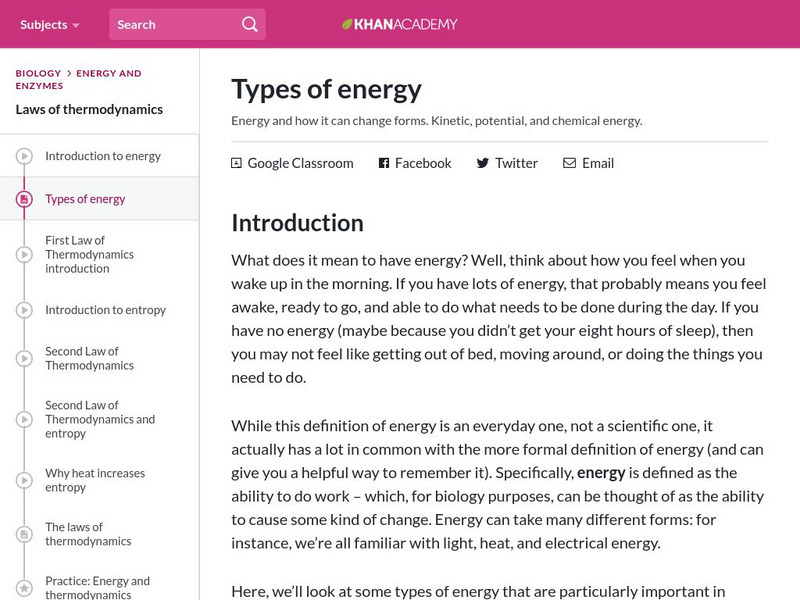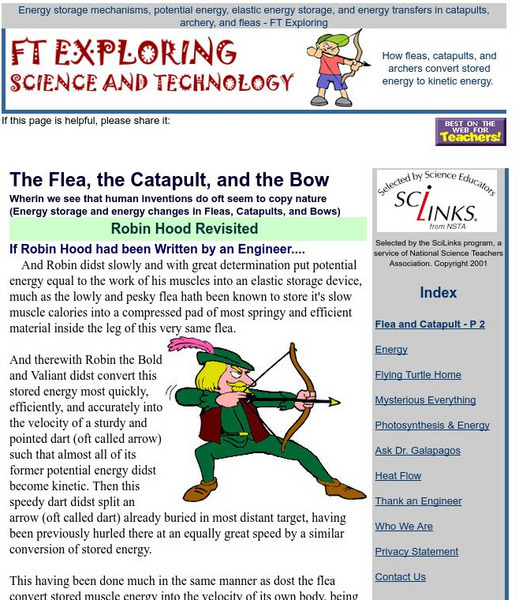Khan Academy
Khan Academy: What Is Kinetic Energy?
Learn what kinetic energy means and how it relates to work.
Bozeman Science
Bozeman Science: Work and Energy
In the following video Paul Andersen explains how the mechanical energy added or removed from a system results from work. For work to occur a force must act parallel to the displacement of the system. Since work and energy are equivalent...
Khan Academy
Khan Academy: Biology: Enzymes and Energy: Types of Energy
An article that reviews over the different types of energy: kinetic, potential, and chemical.
Open Curriculum
Open Curriculum: Simplifying the Energy Zoo
Physics students find out how to effectively define and clarify kinetic and potential energy.
Khan Academy
Khan Academy: Basics of Enzyme Kinetics Graphs
Learn about the basics of enzyme kinetics graphs, and see examples of the graphs to understand the valuable data that is found on the graph. [12 min, 29 sec]
FT Exploring
Ft Exploring: The Flea, the Catapult, and the Bow: Robin Hood Revisited
Find out how fleas, catapults, and archers convert stored energy into kinetic energy.
Energy for Sustainable Development
Kids and Energy: Hydro Energy
Hydropower is a clean, renewable and reliable energy source which converts kinetic energy from falling water into electricity, without consuming more water than is produced by nature. Quite simply the oldest method by which renewable...
DOGO Media
Dogo News: Hi Tech Fabric Charges Devices on the Run
Read about an innovative technology in fabric that allows users to generate enough electricity through movement to charge devices such as cell phones. Includes video.
Exploratorium
Exploratorium: That's the Way the Ball Bounces
This site explains the factors that determine whether and how much a ball bounces and includes activities to test "bounciness" for yourself!
Cuemath
Cuemath: Temperature
The article explains temperature. Specifically, you will learn about the temperature scale, temperature scale conversions, and the types of instruments used to measure temperature. Included are solved examples and interactive problems...
National Institutes of Health
Ncbi: Amino Acids Are Linked by Peptide Bonds to Form Polypeptide Chains
Proteins are linear polymers formed by linking the a-carboxyl group of one amino acid to the a-amino group of another amino acid with a peptide bond. The formation of a dipeptide from two amino acids is accompanied by the loss of a water...
Other popular searches
- Potential and Kinetic Energy
- Potential Kinetic Energy
- Potential & Kinetic Energy
- Kinetic Energy Questions
- Thermal and Kinetic Energy
- Kinetic Energy Lesson Plans
- Kinetic Energy of Particles
- Kinetic Energy Problems
- Science Kinetic Energy
- Potentail and Kinetic Energy
- Kinetic Energy Experiment
- Pot Entail and Kinetic Energy









